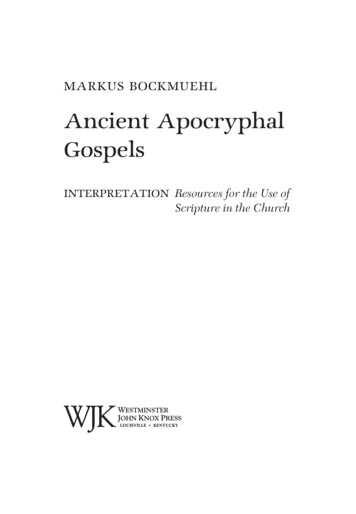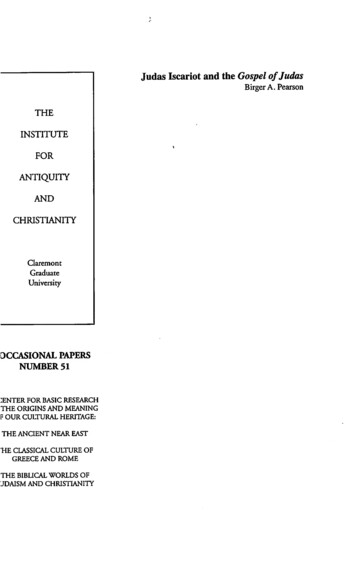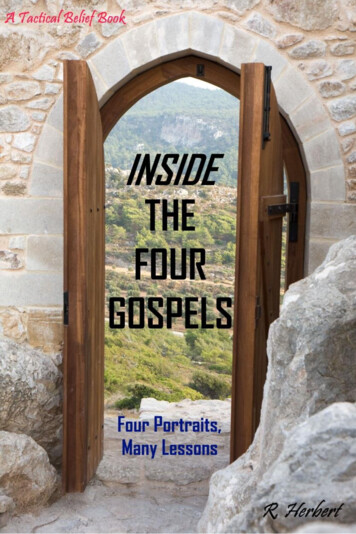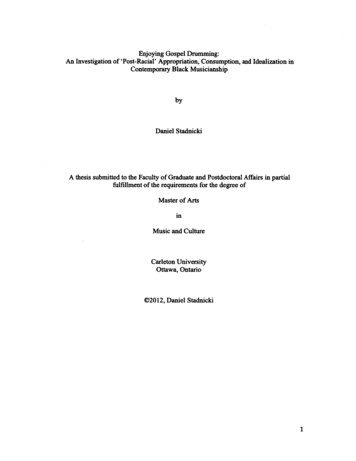
Transcription
by Stephen MitchellThe Gospel according to Jesus(a summary by Pat Evert) IntroductionBecause Jefferson was our great champion of religious freedom,he was attacked as a rabid atheist by the bigots of his day. Hewould compile a version of the Gospels that would include onlywhat he considered the authentic accounts and sayings of Jesus.In a letter to John Adams he wrote, It is as easy to separate thoseparts, as to pick out diamonds from dunghills. “To thecorruptions of Christianity,” he wrote, “I am, indeed, opposed;but not to the genuine precepts of Jesus himself. I am a Christianin the only sense in which he wanted anyone to be: sincerelyattached to his doctrines, in preference to all others; ascribing tohimself every human excellence; and believing he never claimed any other.” It is preciselybecause of his love for Jesus that he had such contempt for the “tricks” that were played with theGospel texts. In this book I have followed Jefferson’s example. I have selected and translated,from Mark, Matthew, Luke, and (very sparingly) from John, only those passages that seem to meauthentic accounts and sayings of Jesus. I found, as Jefferson did, that when the accretions arerecognized and stripped off, Jesus surprisingly, vividly appears in all his radiance. Like theman in Bunyan’s riddle, the more we throw away, the more we have. Ultimately my decisionswere based on what Jefferson called “internal evidence”: the evidence provided by the wordsthemselves. Once the sectarian passages are left out, we can recognize that Jesus speaks inharmony with the supreme teachings of all the great religions: the Upanishads, the Tao Te Ching,the Buddhist sutras, the Zen and Sufi and Hasidic Masters.What is the gospel according to Jesus? Simply this: that the love we all long for in ourinnermost heart is already present, beyond longing. Like all the great spiritual Masters, Jesustaught one thing only: presence. Ultimate reality, the luminous, compassionate intelligence of theuniverse, is not somewhere else, in some heaven light-years away. It didn’t manifest itself anymore fully to Abraham or Moses than to us, nor will it be any more present to some Messiah atthe far end of time. It is always right here, right now. That is what the Bible means when itsays that God’s true name is I am. When Jesus talked about the kingdom of God, he was notprophesying about some easy, danger-free perfection that will someday appear. He was talkingabout a state of being, a way of living at ease among the joys and sorrows of our world. It isalready ours. All spiritual Masters, in all the great religious traditions, have come to experiencethe present as the only reality. The portrait of Jesus that emerges from the authentic passages inthe Gospels is of a man who has emptied himself of desires, doctrines, rules—all the mentalclaptrap and spiritual baggage that separate us from true life—and has been filled with the vivid1
by Stephen Mitchellreality of the Unnamable. What is purity of heart? If we compare God to sunlight, we can saythat the heart is like a window. Cravings, aversions, fixed judgments, concepts, beliefs—allforms of selfishness or selfprotection—are, when we cling to them, like dirt on the windowpane.The thicker the dirt, the more opaque the window. When there is no dirt, the window is by itsown nature perfectly transparent, and the light can stream through it without hindrance. He wantsto tell everyone about the great freedom: how it feels when we continually surrender to themoment and allow our hearts to become pure, not clinging to past or future, not judging orbeing judged. In each person he meets he can see the image of God in which they were created.They are all perfect, when he looks at them from the Sabbath mind. He has no ideas to teach,only presence. He has no doctrines to give, only the gift of his own freedom.We can’t begin to see who Jesus was until we remove the layers of interpretation which thecenturies have interposed between us and him, and which obscure his true face, like coat aftercoat of lacquer upon the vibrant colors of a masterpiece. Jesus begins with the kingdom of Godin the heart. His teachings have such a deep moral resonance that they take us beyond the realmof the moral and make righteousness seem like the most beautiful thing on earth. In this he isprototypically Jewish. What is required of us is to do justly, to love mercy, and to walk humblywith our God. Not “behind”: “with.” But few people are ready to enter the kingdom of God. SoJesus has a second focal point: forgiveness.The first thing we ought to realize about Jesus’ life is that he grew up as an illegitimate child. Itis true that the angel was a ministering spirit, but he wasn’t a meddler: he didn’t appear to theother girls in Israel and say, “Don’t despise Mary; the extraordinary is happening to her.” Theangel appeared only to Mary, and no one could understand her. Has any woman been ashumiliated as Mary was, and isn’t it true here also that the one whom God blesses he curses inthe same breath? As for the social effects on a young child: growing up with the shame of beingcalled a bastard must be almost as painful as being illegitimate in fact. I don’t think that we canfully appreciate who Jesus became unless we realize the overwhelming difficulties he must havehad as an illegitimate child in a small provincial town, which one has to assume was fairly harshand moralistic when it dealt with such matters. But there is a deeper piety of the actual. And thatdeeper piety shows us that God is to be found not in the should be, but in the is. It is remarkablewhat an opposite and complementary shape the life of the Buddha had. He was born the son of aking, and in order to become himself, he had to overcome the difficulties that arise from beingrich, all the temptations of luxury and power, the camel-and-the-eye-of-the-needle syndrome. Wecan see the respective beginnings of these two great men as opposite ends of the spectrum that isthe human condition.Only one word has come down to us directly from the lips of Jesus in its original Aramaic: abba,“father.” For Jesus, the Father is pure generosity, pure creativity, the archetypal power thatgenerates the whole universe, And not only absolute creative power, but also absolute mercy, aquality we associate more with mothers.2
by Stephen MitchellIf there is one reality that marks what we might call the emotional life of Jesus, as glimpsedthrough his various sayings, it is the presence of the divine father and the absence of a humanfather. This is entirely in keeping with the probability that he grew up as an illegitimate child.We know nothing about Jesus’ enlightenment experience, which changed him from carpenterto Master, from “son of a whore” to a son of God. We know nothing we know nothing .perhaps as he was fasting and meditating in the wilderness. And in his own view of himself, heundoubtedly felt, like anyone who has spent a great amount of time in prayer or meditation, thathe was just one partial expression of the divine whole: the moon reflected, however clearly, in adewdrop. That he felt imperfect and fallible simply means that he was one of us. Jesus’ parableof the Prodigal son was primarily intended for the righteous. Its lesson is that those who havealways remained with God, as the older son remained with his father, shouldn’t feel resentfultoward those who have truly repented and returned, but should receive them openheartedly, withjoy, as the father received his younger son. There is an almost unbearable sense of degradation.The son is treated, and feels like, the lowest of the low. He is cut off from all human society,reduced to spending his days taking care of pigs, the unclean animal par excellence, and is toodisgusted to eat the carob pods that they feed on in their contented piggish way. he has entered sodeeply into the younger son because he himself had once felt that way. Not even the greatestMasters were spared the process of spiritual death and rebirth. Suddenly the younger soncomes to himself, becomes himself, no sooner does he realize that he can return, than he doesreturn; no sooner does he realize that he is unworthy to be called his father’s son, than the fatherruns to him and embraces him and treats him like the most worthy of sons. After he returned tohis Father, was there no mother to greet him?Jesus gives us a most vivid example of what it feels like to live in the continual presence oflove, in the present and only tense of the verb God. We can use different metaphors to describethe experience that changed Jesus. It is the kind of experience that all the great spiritual Mastershave had, and want us to have as well. Jesus called this experience “entering the kingdom ofGod.” We can also call it “rebirth” or “enlightenment” or “awakening.” Two examples. First,Paul of Tarsus, came to his experience with a particularly difficult character: arrogant, selfrighteous, filled with murderous hatred of his opponents, terrified of God, oppressed by what hefelt as the burden of the Law, overwhelmed by his sense of sin. In terms of the metaphor, hiswindowpane was caked with grime. We can feel in the writings of Paul the Christian some of thesame egotism, superstition, and intolerance that marred the character of Saul the Pharisee. As asecond and contrary example, perhaps the greatest example of patience and meticulousness in thehistory of religion, I would like to propose Chao-chou, who lived during the golden age of Zen inT’ang dynasty China. Anyone who has undergone the experience of spiritual transformationknows how agonizing it can be. It is like cleaning the heart with a piece of steel wool. After histeacher died, Chao-chou remained in the monastery for a three-year mourning period; then he setout on a twenty-year pilgrimage to hone himself against the greatest Masters of his time. He said,“If I meet a hundred-year-old man and I have something to teach him, I will teach; if I meet aneight-year-old boy and he has something to teach me, I will learn.” Only when he was eightyyears old did he feel mature enough to set up shop as a teacher. He taught for the next forty3
by Stephen Mitchellyears, and his sayings are a marvel of lucidity, compassion, and humor. Jesus must haveundergone a good deal of spiritual development outside the story that has come down to us,before his enlightenment experience. After it, there was still one place of vivid pain and darknessleft in his heart, a residual sorrow from his childhood: Jesus was unclear on one point, that hecouldn’t yet fulfill the commandment to honor father and mother. you cannot devote your life totwo divinities: God and the person you are married to. Your first job is to kill the Buddha.” I hadread that phrase in the old Zen teachings, and I knew what it meant—to let go of any concepts ofa separate, superior, enlightened being outside myself. Then he said, “Your second job is ‘Killingyour parents’ means accepting them just as they are. Then he said, “Your third job is to kill me.”It has been urged that the harsh bearing of Jesus towards his mother and family may be explainedand justified on the grounds (a) that his family did not understand or believe in his mission, (b)that his whole soul was so filled with this mission that there was no room in it for family ties andinterests, and (c) the most important of all, that his special work implied and demanded aseparation from, an abandonment of, all worldly connections and occupations. Integration of thisnew self into one’s life and family and society is the greatest and most difficult challenge inspiritual practice. The work may take seven years or seven lifetimes, but people who are in lovewith God do it gladly. While no other great spiritual teacher I know of had to face such a difficultchildhood as Jesus did, all others had to give up their attachments to personal relationships,especially to the powerful centrifugal force of the family. In this story, the people of Nazarethcan’t believe that the Jesus whom they knew as an illegitimate child has been transformed into aprophet. They see him through the distorting lens of the past, and therefore are completelyunaware of his presence. even the greatest Master may still appear to his family as the child hewas—small, needy, untransformed.It is Jesus’ most important teaching for those who aren’t ready to enter the kingdom of God. Themost that Jesus could have taught these two unhappy people would be to forgive themselves. Inthese sayings of Jesus, God is a mirror reflecting back to us our own state of being. We receiveexactly what we give. The more openhearted we are, the more we can experience the wholeuniverse as God’s grace. Forgiveness is essentially openness of heart. It is an attitude, not anaction. All Israel, all each of us, needs to do is to return to the love that is always ready to receiveus.In Jesus’ sayings, and in his one recorded meeting with his mother, it is apparent that he hasn’tyet forgiven her. His gruffness, his resistance to anything that has to do with family, indicate thathe hasn’t let go. But there is a hint: the story of the Woman Caught in Adultery. “Let whoever ofyou is sinless be the first to throw a stone at her.” Here Jesus is including himself with all humanbeings, as capable of making mistakes. He is certainly not saying, “Only I, who am sinless, havethe right to throw a stone at her,” but rather “None of us has the right.” In the story of theadulteress, Jesus is brought face to face with a woman who symbolically and psychologicallystands for his mother. She too has committed adultery, and he is being asked to judge her. it cannevertheless serve as a symbolic reminder of how we must come to peace with parents, lovers,4
by Stephen Mitchellfriends and enemies, and with the most difficult, unlovable parts of ourselves. The more fullywe accept them and thus let them go, the more light we allow into our hearts. The GospelThis is the book of the good news that Jesus of Nazareth proclaimed. John the Baptizerappeared in the wilderness, proclaiming a baptism of renewal for the forgiveness of sins. And atthat time Jesus came from Nazareth in Galilee, and was baptized in the Jordan by John. Andafterward the Spirit drove him out into the wilderness. And he was in the wilderness for fortydays, with the wild animals.And he began to teach and proclaim the good news of the kingdom of God. And people wereastonished at his teaching, for he taught them like someone who has authority, and not like thescribes. And Simon and his companions searched for him, and when they found him, they said tohim, “Everyone is looking for you.” And he said to them, “Let us go on to the next villages, sothat I can proclaim the good news there too.” And he went through all of Galilee, proclaiming thegood news in their synagogues and healing many diseases. And the man (cleansed of leprosy)went out and began to talk about it excitedly, and the news spread, until Jesus could no longer gointo a village, but had to stay out in the countryside. And people came to him from everydirection.And he taught them many things in parables, and said, “What is the kingdom of God like? It islike a man who sows a seed on the earth: he goes about his business, and day by day the seedsprouts and grows, he doesn’t know how. The earth bears fruit by itself, first the stalk, then theear, then the full grain in the ear. And when the grain is ripe, the man goes in with his sickle,because it is harvest time. “The kingdom of God is like a mustard seed, which is smaller thanany other seed; but when it is sown, it grows up and becomes the largest of shrubs, and puts forthlarge branches, so that the birds of the sky are able to make their nests in its shade. “Thekingdom of God is like yeast, which a woman took and mixed in with fifty pounds of dough,until all of it was leavened. “The kingdom of God is like a treasure buried in a field, which aman found and buried again; then in his joy he goes and sells everything he has and buys thatfield. “Or the kingdom of God is like this: there was a merchant looking for fine pearls, whofound one pearl of great price, and he went and sold everything he had and bought it. “Thus,every scribe who has been trained for the kingdom of God is like a householder who can bringforth out of his treasure room both the new and the old.” And someone asked him, “When willthe kingdom of God come?” And he said, “The kingdom of God will not come if you watch forit. Nor will anyone be able to say, ‘It is here’ or ‘It is there.’ For the kingdom of God is withinyou.”And many people who held the Law in contempt began to follow Jesus. And the scribes said tohim, “Why do you eat with traitors and whores?” And Jesus said to them, “It isn’t the healthywho need a doctor, but the sick. My teaching is not meant for those who are already righteous,but for the wicked.” And he went through all the towns and villages, teaching in theirsynagogues, and proclaiming the good news of the kingdom of God. And the Twelve went withhim, and also certain women whom he had cured of diseases and infirmities: Mary of Magdala,5
by Stephen Mitchellwho had been insane, and Joanna the wife of Herod’s steward Kooza, and Susannah, and manyothers, who provided for them out of their own resources. And his fame spread throughout thesurrounding region of Galilee, and people brought the sick on stretchers to wherever they heardhe was staying, and whenever he came to a town or village, they would lay down the sick in themarketplace. And they brought him those who were suffering from many kinds of diseases andtorments, and demoniacs, and epileptics, and paralytics, and he healed them.And he began to teach them, and said, “Blessed are the poor in spirit, for theirs is thekingdom of God. Blessed are those who grieve, for they will be comforted. Blessed are thosewho hunger and thirst for righteousness, for they will be filled. Blessed are the merciful, for theywill receive mercy. Blessed are the pure in heart, for they will see God. Blessed are thepeacemakers, for they will be called sons of God. No one lights a lamp and then puts it under abasket, but on a lampstand, and it gives light to everyone in the house. In the same way, let yourlight shine before men, so that they may see your good works and glorify your Father in heaven.Don’t think that my purpose is to destroy the Law; my purpose is not to destroy the Law, butto fulfill it. For I tell you that unless your righteousness is deeper than the righteousness ofthe scribes, you will never enter the kingdom of God. Don’t be like them, for your Fatherknows what you need even before you ask him. But pray like this: Our Father in heaven,hallowed be your name. May your kingdom come, may your will be done on earth as it is inheaven. Give us this day our daily bread, and forgive us our wrongs as we forgive those whohave wronged us. And do not lead us into temptation, but deliver us from evil.“Don’t judge, and you will not be judged. For in the same way that you judge people, youyourself will be judged. Why do you see the splinter that is in your brother’s eye, but don’t noticethe log that is in your own eye? First take the log out of your own eye, and then you will seeclearly enough to take the splinter out of your brother’s eye. Therefore, whatever you wantothers to do to you, do to them. This is the essence of the Law and the prophets. Everyone whohears what I say and does it is like a man who built his house upon rock; and the rain fell and thefloods came and the winds blew and beat against that house, and it didn’t fall, because it wasfounded on rock. And everyone who hears what I say and doesn’t do it is like a man who builthis house upon sand; and the rain fell and the floods came and the winds blew and beat againstthat house, and it fell; and great was its fall.”And when his family heard about all this, they went to seize him, for they said, “He is out ofhis mind.” A mute demoniac is healed. A woman in the crowd, who had been bleeding fortwelve years, is healed. The child of a Roman leader is raised. Many people who heard himwere bewildered, and said, “Where does this fellow get such stuff?” and “What makes him sowise?” and “How can he be a miracle-worker? Isn’t this the carpenter, Mary’s bastard, thebrother of James and Joseph and Judas and Simon, and aren’t his sisters here with us?” And theywere prevented from believing in him. And Jesus said, “A prophet is not rejected except in hisown town and in his own family and in his own house.” And he was unable to do any miraclethere, because of their disbelief.A syrophoenician woman gains favor for her daughter. A deaf man is made to hear and speak.A blind man made to see. A demon possessed son is cleansed. And he called a child over, and6
by Stephen Mitchellput him in front of them; and taking him in his arms, he said, “Truly I tell you, unless youreturn and become like children, you can’t enter the kingdom of God.”A certain scribe asks, “Rabbi, what must I do to gain eternal life?” . Love you neighbor in theParable of the Good Samaritan. Another time, the tax-gatherers and prostitutes were allcrowding around to listen to him. And the scribes grumbled, and said, “This fellow welcomescriminals and eats with them.” The Parable of the lost sheep and the ninety nine. the parable ofthe lost coin found. And the parable of the prodigal son(s).Jesus saw this, he was indignant, and said to them, “Let the children come to me, don’t try tostop them; for the kingdom of God belongs to such as these. Truly I tell you, whoever doesn’taccept the kingdom of God like a child cannot enter it.” And he took them in his arms, andput his hands on them, and blessed them. And Jesus looked around at his disciples and said,“Children, how hard it is for the rich to enter the kingdom of God. It is easier for a camel togo through the eye of a needle than for a rich man to enter the kingdom of God.”The next morning, as Jesus was teaching in the Temple, the scribes brought a woman who hadbeen caught in adultery, and they stood her in the middle. And they said to him, “Rabbi, thiswoman was caught in adultery, in the very act. Moses in the Law commanded us to stone suchwomen to death; what do you say?” He stood and said to them, “Let whoever of you is sinless bethe first to throw a stone at her.”.And Jesus said, “Sit here, while I pray.” And going off by himself, he prostrated himself on theground and prayed. And he said, “Abba, all things are possible for you. Take this cup from me.Nevertheless, not what I want, but what you want.” And all the disciples abandoned him, andfled.And they took Jesus to the High Priest. And early the next morning, the chief priests, with theelders and scribes, bound Jesus and took him away and handed him over to Pilate. And Pilatesentenced Jesus to death, and flogged him, and handed him over to his soldiers to be crucified.Jesus uttered a loud cry, and died. CommentaryBaptism - Mark or his source, followed by Matthew and Luke, heavily mythologizes thisincident: sky opening, spirit descending in the form of a dove, heavenly voice acknowledgingJesus as the divine Son. But any good spiritual teacher will discourage us from taking them tooseriously, and will teach us to let them come and go like any other experience.He teaches the good news: What is “the good news”? That true life, eternal life, has been found—it is not something promised, it is already here, it is within you: as life lived in love, in lovewithout subtraction or exclusion, without distance. Everyone is the child of God—Jesusdefinitely claims nothing for himself alone—and as a child of God everyone is equal to everyoneelse.The first disciples - These two incidents, the calling of Simon and Andrew and James and John,are what the German scholar Rudolf Bultmann called “ideal scenes”: incidents which theEvangelist or a previous editor created as examples of actual events. Here, although the scenes7
by Stephen Mitchellare obviously stylized, they give a sense of the great personal magnetism that Jesus must havehad.At Capernaum - And they came to Capernaum. And on the Sabbath, Jesus went into thesynagogue and taught. And people were astonished at his teaching, for he taught them likesomeone who has authority, and not like the scribes. In a larger sense, the scribes are those whohave made themselves a cozy den in the religious doctrine of their time. In certain ways they areadmirable, and if their lives are decent and generous they deserve much praise. But they are notgood teachers of spiritual truth, because they only believe in—they haven’t experienced—God.They don’t realize that all holy texts are provisional, and that the true word of God is the wordthat has become flesh. When Jesus spoke, he didn’t need to quote scripture; his own heart wasscripture. That is why he could speak with authority.First healings - Further “ideal scenes”: stylized examples of actual, typical events. Almostnobody thinks the preserved stories are accurate in all details, but few scholars would deny thatat least some of them probably derive from reports of “cures” that actually occurred in Jesus’presence and were understood by the patients, the observers, and Jesus himself as miraclesperformed by him. Such cures made Jesus famous. To understand their importance, we mustremember that ancient Palestine had no hospitals or insane asylums. The sick and insane had tobe cared for by their families, in their homes.The kingdom of God - The parables originally circulated as independent sayings, as did all thewords of Jesus; only much later were they placed in their current settings by the Evangelists orby previous editors. The subject of this first parable is the birth of spiritual awareness, itsmystery and wonder. Just as a seed, under the proper conditions of sunlight and water, sproutsin the ground, effortlessly and beyond our control. The next five parables (A mustard seed, yeast,treasure buried in a field, merchant looking for fine pearls, a householder who can bring forth outof his treasure room both the new and the old) tell about the discovery and growth of thekingdom of God. Here Jesus is talking about two different aspects of the experience. When wefirst discover the kingdom, we are overwhelmed by wonder and joy, and we realize that nothingin the world of birth and death has ultimate value, and that therefore everything does. From thefirst moment, the kingdom is fully present, like a treasure, like a pearl. But in terms of its effect,the kingdom of God is something that grows gradually. When we discover it, we are still cloggedup with many kinds of selfish concerns, which divert our attention from it and obstruct its powerin our life. Gradually, as our transparency grows, its power grows. Not that the light isn’t fullypresent, from the beginning; it’s just that we can’t yet allow it to shine through. Meister Eckhartsaid, “The seed of God is in us. and God seeds grow into God.And someone asked him, “When will the kingdom of God come?” And he said, “The kingdom ofGod will not come if you watch for it. Nor will anyone be able to say, ‘It is here’ or ‘It is there.’For the kingdom of God is within you.” My experience tells me that the Kingdom of God iswithin us. If, therefore, we wait for the Kingdom to come as something coming from outside, weshall be sadly mistaken. (Mohandas K. Gandhi). It always refers to the inward parts of a person,“my heart within me.”With the wicked - And many people who held the Law in contempt began to follow Jesus. Andthe scribes said to him, “Why do you eat with traitors and whores?” And Jesus said to them, “It8
by Stephen Mitchellisn’t the healthy who need a doctor, but the sick. My teaching is not meant for those who arealready righteous, but for the wicked.” It is essential to understand that what is at issue here isassociating with the wicked, not forgiveness of the wicked. The traditional Christian viewfalsifies the issue. The point of the passage is that the scribes were shocked at Jesus’ associationwith the wicked; being ordinary pious people, they thought that it was dangerous and futile tomix with such characters. Their attitude was exactly the same as the attitude of Paul and the earlychurch—for example, “Have nothing to do with any fellow-Christian who is a fornicator or agreedy man”. This is not a question of conscience, but of vision. Because the Master’s visioncomes from beyond good and bad, he can love the essential humanity in all people, and he cansee the good within the bad. He doesn’t do anything to help others; in simply being himself he ishelping them in the best possible way. When we look with the eye of nonjudgment—that is, withthe eye of love—our vision includes all of humanity. We can be sure that Jesus felt he had aparticular mission to the wicked, and it is very probable that he was misunderstood and bitterlycriticized for this.The beatitudes - Meister Eckhart defines a person who is poor in spirit as “one who wantsnothing and knows nothing and has nothing.” Blessed are the pure in heart: Not that selfishconcerns don’t arise for them; but they aren’t attached to these concerns; they have no self forselfishness to stick to; hence they can be carried along in the clear current of what is.Fulfilling the law - He is affirming the Law, but taking it to an even deeper level of compassion.Don’t think that my purpose is to destroy the Law; my purpose is not to destroy the Law but tofulfill it. For I tell you that unless your righteousness is deeper than the righteousness of thescribes, you will never enter the kingdom of God. For if you love only those who love you, whatcredit is that to you: But love your enemies, and give, expecting nothing in return; and yourreward will be great, and you will be sons of the Most High. Jesus, like other Jewish prophets,doesn’t use this word in a mor
The Gospel according to Jesus (a summary by Pat Evert) . Jesus begins with the kingdom of God in the heart. His teachings have such a deep moral resonance that they take us beyond the realm . fully appreciate who Jesus became unless we realize the overwhelming difficulties he must have ha










